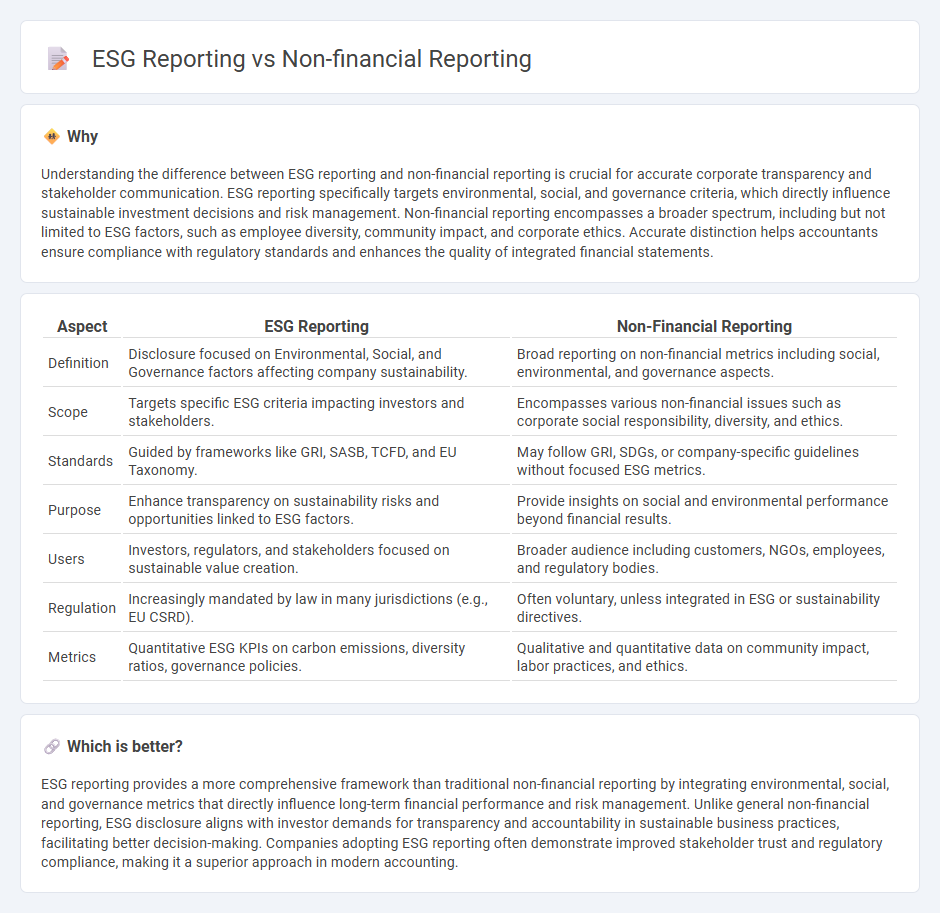
ESG reporting focuses on environmental, social, and governance factors that impact a company's long-term sustainability and stakeholder value, while non-financial reporting encompasses a broader range of performance indicators including social responsibility, human rights, and diversity metrics. ESG reports provide investors and regulators with quantitative and qualitative data critical for assessing a company's ethical impact and resilience in a volatile market. Explore the distinctions and benefits to enhance your understanding of modern corporate transparency practices.
Why it is important
Understanding the difference between ESG reporting and non-financial reporting is crucial for accurate corporate transparency and stakeholder communication. ESG reporting specifically targets environmental, social, and governance criteria, which directly influence sustainable investment decisions and risk management. Non-financial reporting encompasses a broader spectrum, including but not limited to ESG factors, such as employee diversity, community impact, and corporate ethics. Accurate distinction helps accountants ensure compliance with regulatory standards and enhances the quality of integrated financial statements.
Comparison Table
| Aspect | ESG Reporting | Non-Financial Reporting |
|---|---|---|
| Definition | Disclosure focused on Environmental, Social, and Governance factors affecting company sustainability. | Broad reporting on non-financial metrics including social, environmental, and governance aspects. |
| Scope | Targets specific ESG criteria impacting investors and stakeholders. | Encompasses various non-financial issues such as corporate social responsibility, diversity, and ethics. |
| Standards | Guided by frameworks like GRI, SASB, TCFD, and EU Taxonomy. | May follow GRI, SDGs, or company-specific guidelines without focused ESG metrics. |
| Purpose | Enhance transparency on sustainability risks and opportunities linked to ESG factors. | Provide insights on social and environmental performance beyond financial results. |
| Users | Investors, regulators, and stakeholders focused on sustainable value creation. | Broader audience including customers, NGOs, employees, and regulatory bodies. |
| Regulation | Increasingly mandated by law in many jurisdictions (e.g., EU CSRD). | Often voluntary, unless integrated in ESG or sustainability directives. |
| Metrics | Quantitative ESG KPIs on carbon emissions, diversity ratios, governance policies. | Qualitative and quantitative data on community impact, labor practices, and ethics. |
Which is better?
ESG reporting provides a more comprehensive framework than traditional non-financial reporting by integrating environmental, social, and governance metrics that directly influence long-term financial performance and risk management. Unlike general non-financial reporting, ESG disclosure aligns with investor demands for transparency and accountability in sustainable business practices, facilitating better decision-making. Companies adopting ESG reporting often demonstrate improved stakeholder trust and regulatory compliance, making it a superior approach in modern accounting.
Connection
ESG reporting and non-financial reporting are interconnected as both focus on disclosing a company's environmental, social, and governance impacts beyond traditional financial metrics. These frameworks provide stakeholders with transparency regarding sustainability practices, risk management, and social responsibility efforts. Integrating ESG factors into non-financial reports enhances corporate accountability and aligns with regulatory requirements like the EU Non-Financial Reporting Directive (NFRD).
Key Terms
Materiality
Materiality in non-financial reporting centers on disclosing information that significantly impacts stakeholders' decisions, emphasizing environmental, social, and governance (ESG) factors relevant to the company's operations. ESG reporting specifically integrates material sustainability issues within corporate strategy, providing a detailed assessment of risks and opportunities aligned with global standards such as the GRI, SASB, and TCFD frameworks. Explore how understanding materiality enhances transparency and drives better ESG performance for your business.
Stakeholder Engagement
Non-financial reporting encompasses a broad spectrum of environmental, social, and governance (ESG) disclosures aimed at illustrating a company's overall impact beyond financial metrics, with stakeholder engagement serving as a critical component in identifying and addressing material issues. ESG reporting, as a subset of non-financial reporting, specifically prioritizes transparency and accountability in corporate commitments related to sustainable practices, incorporating direct input and concerns from diverse stakeholder groups such as investors, employees, customers, and communities. Explore more to understand how effective stakeholder engagement drives meaningful ESG disclosures and enhances corporate sustainability strategies.
Sustainability Metrics
Non-financial reporting encompasses broad disclosures including social, environmental, and governance factors, whereas ESG reporting specifically targets Environmental, Social, and Governance criteria aligned with investor expectations and regulatory frameworks. Sustainability metrics in ESG reporting prioritize quantifiable data such as carbon emissions, energy consumption, labor practices, and board diversity to assess corporate impact and risk management. Explore comprehensive frameworks and best practices to elevate your understanding of sustainability metrics and their role in transparent ESG reporting.
Source and External Links
Non-financial reporting: responsible, far-sighted management - PwC - Non-financial reporting involves disclosing information beyond financial figures to reveal how an organization's value creation impacts social, environmental, and governance themes, primarily relevant for large multinational companies to assure long-term value and corporate responsibility.
Non-financial reporting - globalnaps.org - Non-financial reporting, including sustainability and human rights impacts, is becoming increasingly mandatory for large companies in the EU under directives such as Directive 2014/95/EU, aiming to enhance transparency for diverse stakeholders beyond just financial performance.
A Comprehensive Guide to Non-Financial Reporting - This guide explains the four main non-financial reporting standards--CSRD, ISSB, CDP, and GRI--highlighting their differences in scope, focus, applicability, and audit requirements to help businesses meet evolving transparency demands in ESG and corporate sustainability reporting.
 dowidth.com
dowidth.com